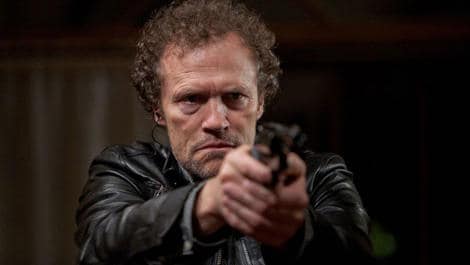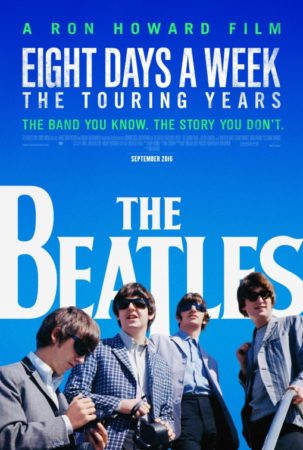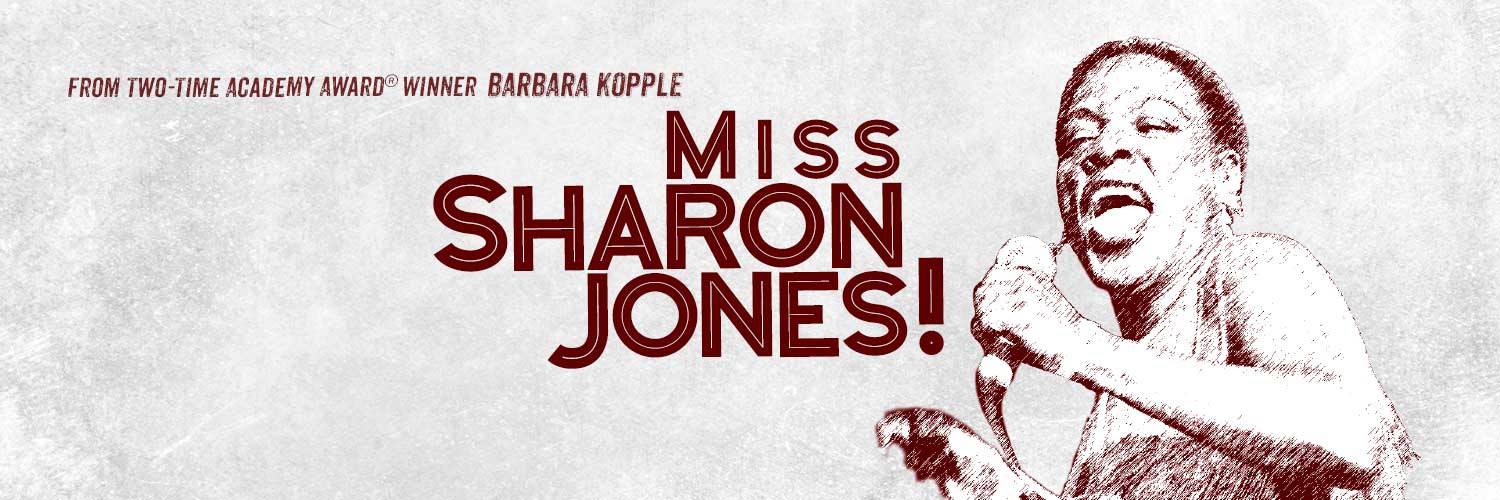Jim: That is an incredibly original and very smart approach. It affects you more on a psychological level mainly because you’re experiencing psychological conflict at times. Because even throughout it seems like — because often serial killers are portrayed as being like Hannibal Lecter: smart, talented, without morality. But there’s something about Michael Rooker’s portrayal that shows a real sense of internal conflict, that maybe he doesn’t want to be who he is, but he ultimately lacks control to do what he does. I sense almost like a sadness when he’s looking into the hotel bathroom mirror, like maybe he doesn’t want to do what he’s about to do but knows that there’s no way that Becky can accompany him. What was it like casting Michael Rooker as this role? Because it sort of defined him for probably ever. When he walked into the room, what was your first though
John: Well, before he walked into the room, actually. We were looking for Henry and we had Becky. We had Otis. They had both come from the Organic Theatre, Gordon’s company that Richard Fire was a writer and actor in. The company had just broken up and they were all looking for work. Michael Rooker had not been part of it. Michael Rooker was not a know quantity in the Chicago Theatre had seen like the others were, and we had a makeup artist — we were working way in the script and like I said, we’d cast a number of the roles. Didn’t have a Henry. Saw a young man from the Chicago Theatre who had some small success, but he was young and good looking and very full of himself. We offered him the role and he turned it down. I’ve never heard from him again. He’s had no career, so his loss, my gain. And then we had another guy who was a wonderful actor and brought some chops to it, but he was older and he wasn’t really physically a hot number, so the relationship would have had to be changed between him and Becky from a romance to more of a father/son dynamic. But we were just about ready to hire this man, and then our makeup guy, the guy we hired to do prosthetics and stuff, had worked with theatre in Chicago and said, “I know this actor. I worked with him in a play. You should meet him.” And I said okay, and Richard Fire really didn’t like this makeup guy very much and he said no. Anything this guy suggested, Richard’s answer was no. So I said “What have we got to lose?” It was sort of ‘life isn’t perfect.’ We haven’t found the perfect Henry but we’re going to have to find someone who can act and do the best we can, and that sat. But I said, “Come on, Richard. We’ve got nothing to lose. Let’s see who this guy is.”
And so anyway we’re sitting at the table where we wrote in his apartment. A knock at the door. I got up because I was closer to the door and opened the door, and there stood Michael wearing the identical clothes he wears in the movie. The only thing we changed was his shoes. And my jaw hit the floor. There was Henry. It’s just like — by God, it’s giving me just…telling this kind of story. I don’t know, but again, I’ve told this story 10,000 times. But I said a prayer, “Oh God, please let him be able to act,” because physically here he is. This is him, done deal. And he came in. He spent about a half hour with us, and Mike was very unpolished these days. He went a few years out of Jasper, Alabama, and then had a rough life, but was a brilliant guy in many ways. And Richard just said, “Well, you know–” and I said, “Richard, stop.” If I ever knew anything in my life, you know? And so Michael left. He was done and he left. And Richard lived in a high rise, so I waited.I was listening for the elevator to make sure that Michael was gone and out of earshot. I immediately grabbed the phone. I picked it up and called Lisa Deadman, who was our line producer, and I said, “Book this guy. I don’t care what it takes. He’s going to be a movie star.
Jim: Wow. Good instincts there.
John: Some things are pretty obvious
Jim: Yeah, that’s true. I think if he just appeared in front of my door right now I would be really terrified. But yeah, being from the south side of Chicago, my dad especially was able to spot certain locals that kind of looked familiar, but shooting Chicago in something like John Hughes’ movies, it seems like a lot of the touristy, obvious places.
John: Well, John Hughes, you know, he’s a North Shore.
Jim: Yeah, exactly. But you kind of utilized the kind of environments that — like another great director I’ve talked with, Andrew Davis, would use in his films.
John: Andrew Davis is from the south side.
Jim: Yeah, so I see connection there. Shooting Henry, did you opt to shoot wherever you could, wherever it looked best because you had this low budget approach? And what was it like trying to secure permits, if you had to, during that time?
John: Well, I studied television production and still photography at Columbia College, and before that I studied art at the University of Illinois. And as I often tell people, I didn’t go to film school. I went to art school. So to me, this is my medium. Henry, I don’t classify it as entertainment. I classify it as a work of art, which makes it hard to work. They don’t want people making works of art. They want people making entertainment, which is absolutely fine.
Anyway, I had done a lot of still photography. I grew up — the streets of Chicago is just an incredibly photogenic city. And I don’t mean it’s necessarily — I publish on my fFacebook page a lot of photographs. I don’t make that many phonecalls, but on my laptop I have 35,000 photos I’ve taken with my iPhone. I love my iPhone and the camera. And the city — I published a couple of photographs from the south, Hegewisch or Hammond, places which are endlessly photogenic to me. Chicago’s the most photogenic city I know, and somebody wrote in “Have you ever been to Paris?” It’s like, yeah, fuck you. Many times I’ve been to Paris and it’s beautiful, 10x, 100x more beautiful in Chicago, but it isn’t more photogenic. Chicago just — you can hold your camera up, close your eyes, hit the shutter, and look and go “Look at that!” It’s just so…
I’ve been taking street photographs for years, and I’d picked all these “Someday this would be a great trip and that would be a great trip.” There was a scene of Michael fishing out on the racks on 103rd Street Beach where we used to go to the Beach as kids. We cut that scene, but on the skyway when he’s driving, he’s up on the skyway on the way to Indiana. So yes, there were some places that I already knew, and then some — interestingly I was at the screening at the film festival the other night, and a guy comes up and told me what city he’s from — town, really — on the Illinois-Wisconsin border where that Sunset Motel. And I’d never been there before. I don’t know how we found that, but he said it’s still there, which I was happy to here. So, locations were cheap because there was almost nothing shooting in Chicago, and the one time we actually did — we called the cops early on just to clear things and they said, “Listen, what is your budget again?” and we said $100,000, and they said, “Listen, if you’re going to be anywhere where there’s traffic, call us and let us know so someone doesn’t arrest you, or whatever. And we’ll make sure the officers on duty know you’re there and they’ll leave you alone. Otherwise just go make your little movie and we won’t bother you.” But we did, one day — for whatever reason, we chose the corner of Oak and Michigan Avenues, which is one of the more prominent intersections in the city of Chicago, and we needed to close it down because that’s where Henry and Otis were cruising around with the camera. I don’t know why we chose there. I guess we wanted them in the high-end part of the city, and so we did — of course, it’s $110 to rent a cop with a car, one cop with one car, for the day, and he actually shut off the intersection corner of Oak and Michigan Avenue multiple times over the course of the couple hours that we were there. It’s like shutting down Time Square for $100. It’s pretty amazing. You couldn’t do it today.


